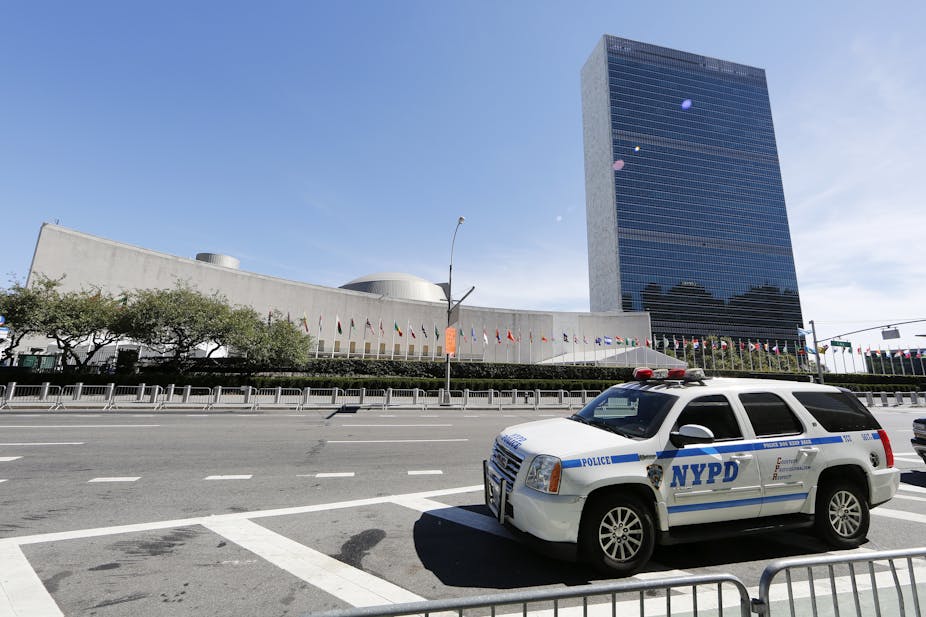One of the main reasons World War II happened was the failure of League of Nations, which remained impotent partly because the US refused to join it. After the war claimed tens of millions of lives and left an unprecedented trail of devastation, the world – this time including the US – created the UN “to save succeeding generations from the scourge of war”. For all the organisation’s failings, it has played a central role in making sure the past 70 years passed without a world war.
But with Donald Trump leading the US, all that could change. The new president is preparing an executive order that will drastically reduce US funding to all parts of the UN, a move that could result in the end of the organisation as we know it.
The US contributes 22% of the regular UN budget, and reducing or removing that funding could have dire consequences. But facts, figures and potential consequences are not really what Trump is concerned about – this move is above all a way of advancing his dogged defence of Israel, his attacks on women, and his nationalist agenda.
Trump’s order, entitled “Auditing and Reducing US Funding of International Organisations”, calls for a moratorium on sending any American funds to any part of the UN that grants full membership to the Palestinian Authority. (On that front he has also specifically targeted the International Criminal Court, an entity outside the UN system.) He takes a similar stance on any part of the UN system that funds support for abortions; depending on how broadly that statement is interpreted, such a move could threaten the World Health Organisation and several of the UN’s human rights bodies.
Trump has also named two UN mechanisms as specific targets for further investigation vis-à-vis US contributions: the United Nations Population Fund, which deals with maternal and reproductive health, and peacekeeping operations
The US contributes 10% of the Population Fund’s budget, and given that Trump set out to attack women’s rights and reproductive health as soon as he got his feet under the Oval Office desk, it is fairly predictable that he would want to undermine the Population Fund. But why is he going after peacekeeping? The answer, it seems, is out of sheer nationalism.
The indispensables
The US currently provides more than a quarter of the UN’s peacekeeping funds, which are calculated in a similar manner to the regular budget but with additional contributions required of the five permanent members of the Security Council (China, France, Russia, UK, and US). Given that these five countries play the leading role in peace and security, including creating peacekeeping operations, all UN members agreed that they ought to contribute additional funds to that budget.
Peacekeepers are the UN’s most effective tool for maintaining international peace and security; it sends them to the most dangerous parts of the world to protect civilians from atrocities such as genocide and crimes against humanity. This work is at the centre of the UN’s raison d'être, so it is hardly surprising that the peacekeeping budget is the biggest of all UN apparatus.

Many people, Trump and his supporters among them, simply do not understand just how crucial peacekeeping is. They look at the money being spent on troops and the weapons and equipment being donated and wonder why those resources aren’t being used to bolster their own national militaries. Others point to the small number of peacekeepers who use their platform to commit crimes – as sadly occurs in all large institutions – and they denigrate and denounce the entire system.
What they don’t realise is that without UN peacekeepers on the ground, tens of millions more people would be killed, displaced, or suffer grave abuses. If they don’t care about those people, they would do well to realise that without peacekeeping, armed conflicts will threaten the peace and security of the entire world.
And even if they don’t care about international peace and security, Trump and his supporters ought to realise that were it not for peacekeeping operations in places such as the Democratic Republic of Congo, US companies and manufacturers wouldn’t be able to access the rare minerals that can often only be found in war-torn and insecure countries.
Turning off the tap
There are some obstacles in Trump’s path. Many of the US’s contributions to the UN are not voluntary: all member states are legally obliged to contribute a percentage of the UN’s budget, and if the US wants to remain a member – another question altogether – then it has to pay its fees.
Nor is it for Trump to determine the size of the US’s fees. The UN uses a particular method to calculate what each country should contribute to the regular budget: every three years, the General Assembly calculates those fees by looking at a state’s percentage share of the Gross National Product of all UN members combined (with some adjustments for national debt and other factors). The maximum contribution for any one country is 22% of the budget, so given that the US makes up more than 24% of the world’s total GDP, it’s actually contributing less than it should.
If Trump signs his executive order, we can hope the State Department’s lawyers remind him that he cannot legally reduce or remove these so-called “assessed contributions” to the regular budget. But even then, he would still be able to slash voluntary contributions to UN funds, programmes and specialised agencies, such as UNICEF and the World Health Organisation.
The consequences of this move could be dire. Children would not receive vaccines, HIV-prevention and treatment programmes would close, food aid would be drastically reduced across scores of countries. It could also be the a precursor to something far worse: the US withdrawing from the UN, the house of cards toppling, and history repeating itself.

